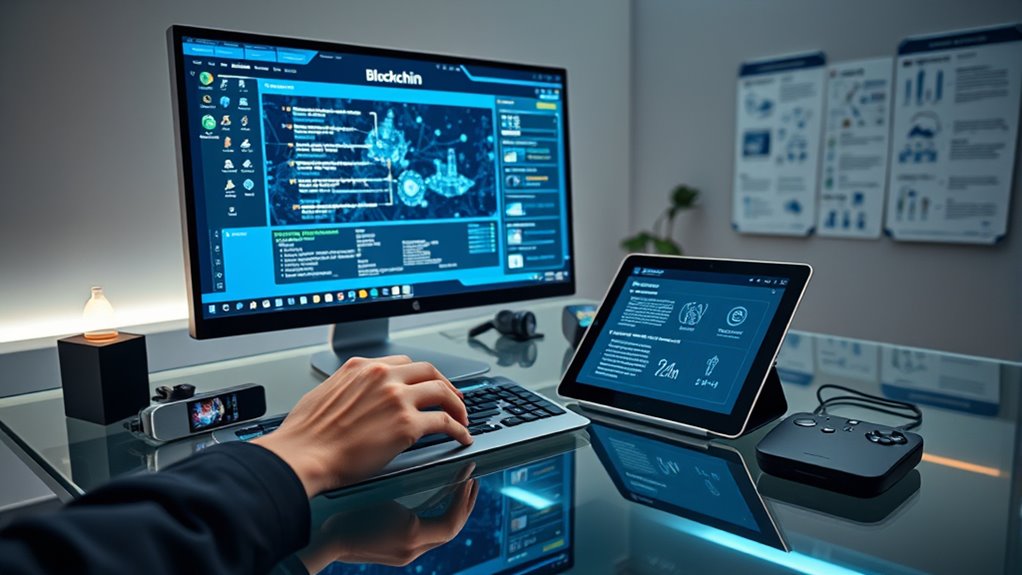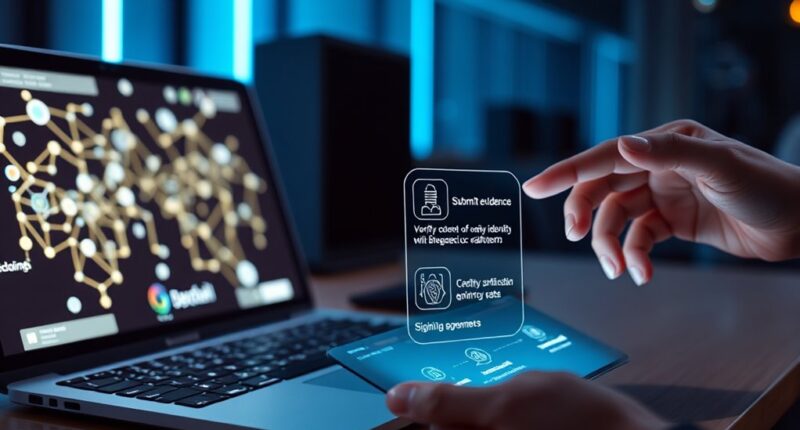To participate in a blockchain-based dispute resolution platform, start by creating an account on the platform. Link your digital wallet to verify transactions and store tokens securely. When you need to raise a dispute, submit your case along with supporting evidence, which is securely stored on the blockchain for transparency and immutability. Smart contracts will guide the resolution process automatically. Continue exploring to discover how these steps guarantee fair and efficient dispute handling.
Key Takeaways
- Create an account on the blockchain dispute platform and link a digital wallet.
- Submit your dispute with supporting evidence securely stored on the blockchain.
- Engage with arbitration panels or AI decision engines as part of the resolution process.
- Use smart contracts to automate dispute handling and enforce resolution terms automatically.
- Track and verify every step of the process through transparent blockchain records.

Participating in a blockchain dispute platform allows you to resolve conflicts efficiently and transparently, leveraging the technology’s inherent features. This approach simplifies traditional dispute resolution by harnessing smart contract integration, which automates and enforces agreements without intermediaries. When you join a platform that employs smart contracts, you benefit from a streamlined dispute resolution process designed to minimize delays and reduce costs. Smart contracts can automatically trigger dispute resolution procedures when certain conditions are met, ensuring swift action and reducing the need for manual intervention.
Join blockchain dispute platforms to resolve conflicts quickly and transparently with automated smart contracts.
To get started, you typically need to create an account on the platform and link your digital wallet. This wallet stores your tokens and cryptographic keys, which are essential for verifying your identity and transactions. Once registered, you can submit a dispute related to a transaction or agreement stored on the blockchain. The platform’s dispute resolution process often involves predefined rules embedded in smart contracts, which determine how disputes are handled. You might be asked to provide evidence or relevant documentation directly through the platform, which is securely stored on the blockchain, ensuring transparency and immutability.
Smart contract integration is central to this process because it automates many aspects of dispute handling. For example, if a dispute arises over a service delivery, the smart contract might automatically hold funds in escrow until the issue is resolved. The resolution process then activates, guiding both parties through a predefined protocol—sometimes with the assistance of an arbitration panel or an AI-powered decision engine. This automation cuts down on lengthy negotiations and reduces the chances of bias or manipulation. The platform’s transparency means that all actions and decisions are recorded on the blockchain, allowing you to track every step and verify the process.
Participation also involves engaging with the community or designated arbitrators, depending on the platform’s structure. In some cases, you may be asked to vote on a dispute or provide input based on your expertise. The entire process is designed to be fair and efficient, with smart contracts ensuring that agreed-upon terms are enforced automatically once a resolution is reached. As you become more familiar with the platform, you’ll appreciate how smart contract integration and an efficient dispute resolution process work together to provide a secure, tamper-proof environment for resolving conflicts. This method not only saves time but also builds trust among parties, knowing the outcome is based on transparent, blockchain-verified data. Additionally, understanding the role of personality traits can help you navigate and participate effectively in these digital dispute resolutions.
Frequently Asked Questions
What Are the Eligibility Criteria to Join a Blockchain Dispute Platform?
To join a blockchain dispute resolution platform, you need to meet specific eligibility criteria focused on dispute resolution experience or relevant expertise. The platform guarantees accessibility by verifying your identity and providing user-friendly interfaces. You should also comply with the platform’s rules, such as holding a minimum stake or token, to participate in dispute resolution processes. These measures guarantee fair and transparent dispute resolution for all users involved.
How Secure Is My Personal Information During Participation?
Your personal information stays secure during participation thanks to data encryption, which protects your data from unauthorized access. Blockchain platforms also follow strict privacy policies designed to safeguard your identity and details. These measures guarantee your information remains confidential, giving you peace of mind while resolving disputes. Always review the platform’s privacy policies to understand how your data is handled, and rest assured that robust security practices are in place to protect your information.
Are There Any Costs Associated With Joining or Using the Platform?
Joining or using the platform usually involves some costs. You might encounter transaction fees when submitting disputes or participating in resolution processes. Additionally, there could be membership costs depending on the platform’s structure. These fees help cover operational expenses and guarantee smooth service. Always check the platform’s terms beforehand to understand any transaction fees or membership costs, so you’re prepared and avoid surprises.
Can I Participate Anonymously or Do I Need to Reveal My Identity?
Did you know that 60% of users prefer pseudonymous participation to safeguard their privacy? You can absolutely participate anonymously on a blockchain-based dispute resolution platform. Using pseudonymous identities, you maintain your privacy while engaging in the process. This approach ensures you don’t have to reveal your real identity, giving you peace of mind and control over your personal information. Privacy preservation is a key feature of these innovative platforms.
What Types of Disputes Are Accepted on the Platform?
You can resolve various types of disputes on the platform, including contract disagreements, payment issues, intellectual property claims, and service disputes. The platform accepts dispute categories related to e-commerce, freelance work, and digital assets. It’s designed to handle different dispute categories efficiently, ensuring fair resolution processes for each. Just select the relevant dispute type when submitting your case, and the system will guide you through the appropriate resolution steps.
Conclusion
By joining a blockchain-based dispute resolution platform, you become part of a revolution that’s changing how conflicts are settled—trusting the system as much as the technology itself. Embrace this opportunity to shape a fairer, more transparent future. Remember, in this digital age, you hold the power to influence change; it’s not just about participating, but about pioneering a new era where justice is truly decentralized. The future of dispute resolution is in your hands—are you ready to take the leap?









